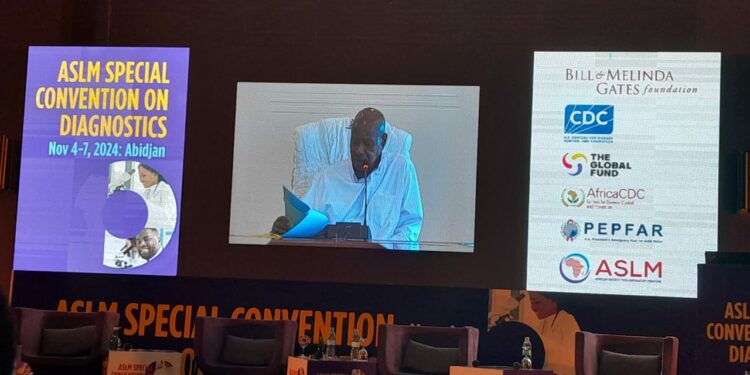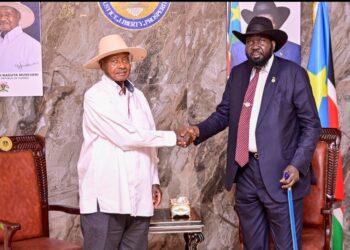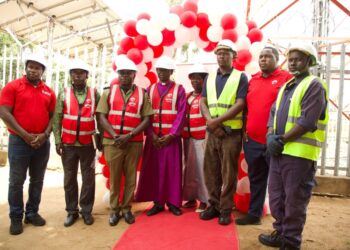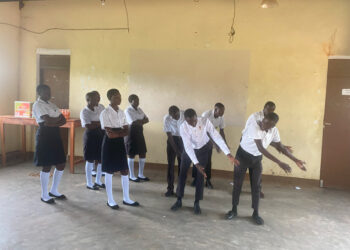In a powerful virtual address to the ASLM LABDF Convention in Abidjan, Ivory Coast, President Yoweri Kaguta Museveni laid out a compelling vision for strengthening health diagnostics across Africa.
Speaking remotely, Museveni first accepted the prestigious ASLM Champion for Improving Health Laboratory Services in Africa Award and highlighted Uganda’s notable achievements and strategies in the field of public health diagnostics.
“It is with a feeling of deep appreciation that I receive this award,” President Museveni began, expressing gratitude on behalf of the Ugandan government and its citizens.
He commended the African Society for Laboratory Medicine (ASLM) for recognizing Uganda’s dedication to advancing laboratory services and emphasized the importance of quality diagnostics as a foundation for effective healthcare.
Citing the World Health Organization, Museveni underscored that 70 per cent of medical decisions rely on diagnostic results, illustrating the critical role of accurate and timely diagnostics. “If the diagnosis is wrong, the prescription cannot be right; and if the prescription is not right, the patient cannot be cured,” he said. This simple yet profound insight underscored the necessity of robust laboratory infrastructure as a cornerstone for disease treatment and prevention.
Museveni’s remarks came at a crucial time when global health systems continue to face the long-term impacts of pandemics and emerging health threats. His call for enhanced diagnostic capabilities is particularly relevant for Africa, a continent striving to build resilient health systems to counter both communicable and non-communicable diseases.
In an engaging reflection on the history of medical science, Museveni referenced the groundbreaking work of Louis Pasteur in 1862, who discovered microorganisms and revolutionized the scientific understanding of disease transmission.
Museveni reminisced about how, as a young student, learning about Pasteur’s discovery motivated him to educate his community on the dangers of unboiled milk, a common practice among the Banyankore that often led to illness. This story exemplified how scientific knowledge can shift cultural practices to foster public health improvements.
Highlighting Uganda’s progress over the decades, Museveni recounted the challenges faced during the HIV/AIDS pandemic in the 1980s. The absence of adequate diagnostic tools at the time allowed the disease to spread undetected, causing significant loss and suffering.
“The spread was like wildfire,” he noted. However, by the time the COVID-19 pandemic emerged, Uganda’s health system was better prepared. Enhanced surveillance, rapid testing capabilities, and effective containment measures marked the country’s robust response.
Museveni praised the ASLM for its leadership in promoting cross-border collaboration and strengthening health laboratory services. He advocated for increased investment in local production of medical supplies, including vaccines and laboratory equipment. “Through experience, we have learned that it is suicidal to rely on other people for medical supplies and research,” he said, emphasizing the need for self-reliance as a pillar of pandemic preparedness and economic development.
Gen Museveni also spotlighted Uganda’s far-reaching health interventions beyond laboratory services. He outlined the evolution of the country’s immunization programs, which initially targeted the “six killer diseases” and later expanded to include vaccines for non-communicable diseases such as HPV, which protects against cervical cancer.
“In addition to our relentless war against HIV/AIDS, we have leveraged technology to ensure our laboratory sector provides greater access to testing as an entry point for disease prevention and treatment,” he elaborated.
Ensuring clean and safe drinking water has been another priority in Uganda’s public health strategy. This has led to a significant reduction in waterborne diseases, including cholera, showcasing a comprehensive approach to health that integrates preventive measures with technological advancements.
Museveni also highlighted Uganda’s support for neighbouring countries and the broader African continent through its National Health Laboratories and Diagnostics Services (NHLDS) and the Supra-National T.B. Reference Laboratory.
Uganda’s leadership in hosting the Global Fund – East, Central, and Southern Africa Health Community (ECSA HC) International Laboratory Systems Strengthening (ILSS) Project has facilitated the training of laboratory professionals from 23 African countries. This initiative promotes knowledge sharing and builds the continent’s capacity for managing current and future health challenges.
Gen Museveni also paid tribute to healthcare workers and institutions committed to building stronger health systems in Africa. “I salute the Africa Centre for Disease Control, ASLM, all our partners in the health sector, the leadership of the Ministries of Health; and all the Health workers, across Africa, for working tirelessly towards the goal of a healthy and productive population,” he said.
The President called all African nations to unite in fostering resilient, independent, and technologically equipped health systems. Noting that Africa can turn its health challenges into opportunities for progress and empowerment.
Do you have a story in your community or an opinion to share with us: Email us at editorial@watchdoguganda.com













